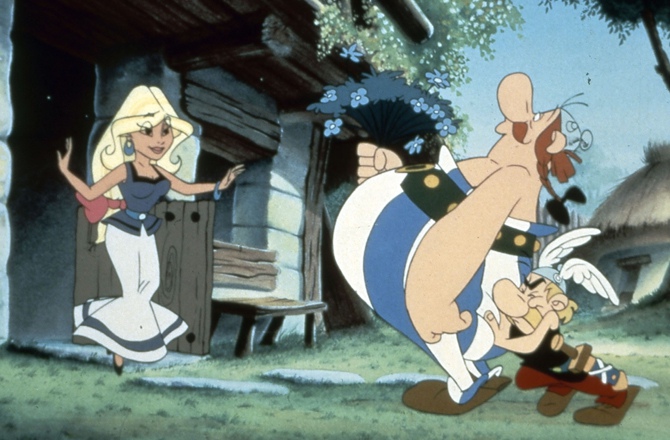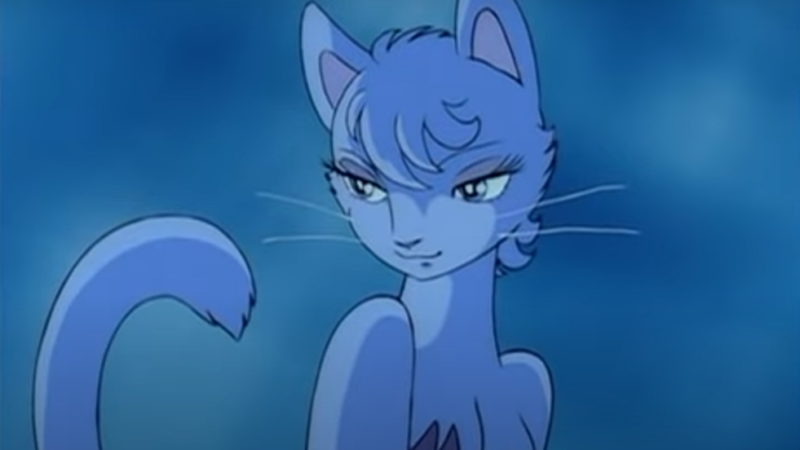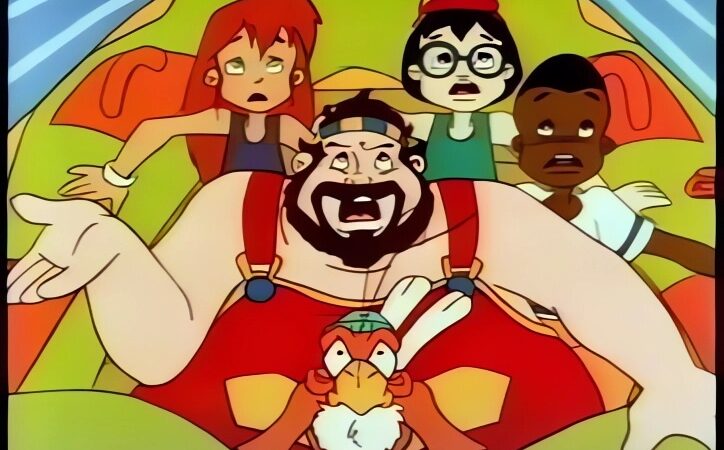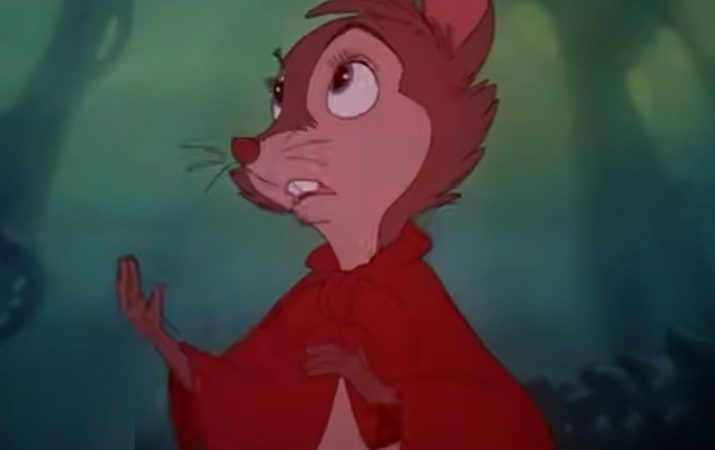Josie and the Pussycats - the animated series of 1970
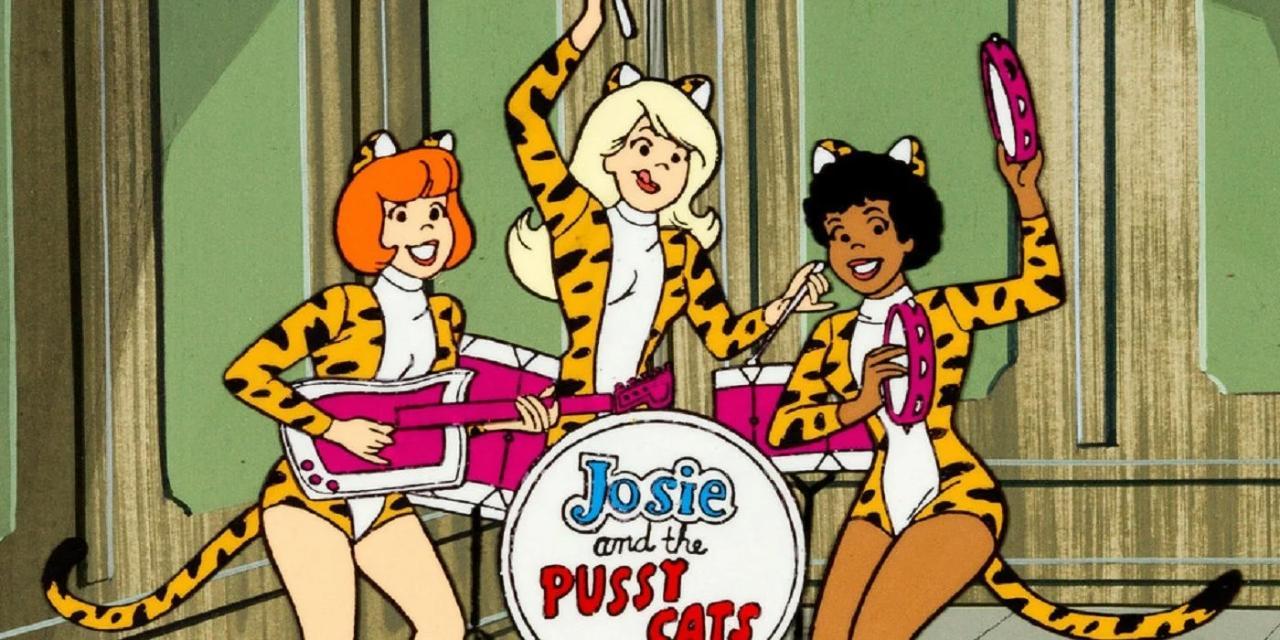
Josie and the Pussycats (Josie and the Pussycats in the American original) is an American cartoon television series, based on the Archie Comics comic series of the same name created by Dan DeCarlo. Produced for the Saturday morning television broadcast by Hanna-Barbera Productions, the series consists of 16 episodes of Josie and the Pussycats that first aired on CBS during the 1970-1971 television season and reruns during the 1971-1972 season. In Italy they have been broadcast since 1980 on various local television stations.
In 1972, the animated series had a sequel with the series Josie and the Pussycats in Outer Space, consisting of 16 episodes of which aired on CBS during the 1972-1973 season and were re-run in the following season through January 1974. Reruns of the original series alternated between CBS, ABC and NBC from 1974 to 1976. This resulted in six years of national Saturday morning television broadcast on three networks.
Josie and the Pussycats stars a pop music band made up of teenage girls, who travel the world with their entourage, engaging in strange adventures of espionage and mysteries. The group consisted of singer, songwriter and guitarist Josie, smart bassist Valerie and blonde drummer Melody. Other characters included their cowardly manager Alexander Cabot III, his conniving sister Alexandra, his cat Sebastian, and beefy roadie Alan.
The show, more like Hanna-Barbera's hit Scooby-Doo, Where Are You! Compared to Josie's original comic, he is best remembered for his music, the girls' leopard-print bodysuits (filled with "long tails and ears for hats," as the acronym states), and for playing Valerie as the first female character of color who appears regularly in a Saturday morning cartoon show. Each episode featured a song by Josie and the Pussycats played on a chase scene, which, similar to The Monkees, showed the group running after and turning away from a series of monsters or evil characters.

History
Josie's animated version was an amalgamation of plot devices, villain types, settings, moods and tones from other Hanna-Barbera shows like Scooby-Doo, Where Are You! , Jonny Quest, Space Ghost and Shazzan.
Like Scooby-Doo, where are you! , Josie and the Pussycats was originally aired with a laugh track. Later versions of home video and DVD omit the laugh track. Cartoon Network and Boomerang, on the other hand, aired the show in its original broadcast format with the laugh track intact.
With each episode we find the Pussycats and the crew traveling, to perform at a concert or record a song in some exotic location where, somehow, often due to something Alexandra did, they found themselves involved in an adventure. The antagonist is always a diabolical mad scientist, spy or criminal who wants to take over the world using a high-tech device. The Pussycats usually find themselves in possession of plans for an invention, an object of interest to the bad guys, a secret spy message, etc., and the bad guys go after them to retrieve it. Eventually, the Pussycats ruin the villain's plans, resulting in a final chase sequence set to a Pussycats song. With the villain captured, the Pussycats return to their concert or recording session, and the final gag is always one of Alexandra's failed attempts to interfere with the Pussycats.
Characters



Josephine "Josie" McCoy (voiced in the original by Janet Waldo / sung by Kathleen Dougherty) - The red-haired singer, songwriter, guitarist and leader of the band. Josie shares an attraction to Alan, the road manager. During the 70s, the character was known as Josie James. Another actress, Judy Waithe, was originally cast as Josie's voice. Waithe was rejected and replaced by Waldo before the show debuted, as his readings of Josie and the Pussycats-hosted in interstitial lore were not at CBS 'liking. Although the correct closing credits were later made, some remastered copies of the series use Waithe credit instead of Waldo among the vocal cast.
Valerie Brown (voiced in the original by Barbara Pariot / sung by Patrice Holloway) - The band's Afro-American bassist and backing vocalist; most often shown playing tambourines. The wise voice of the group, Valerie is highly intelligent and a wizard of mechanics. During the 70s, the character was known as Valerie Smith.
Melody Valentine (voiced in the original by Jackie Joseph / sung by Cherie Moor) - The band's drummer and backing vocalist and a stereotypical silly blonde. What Melody lacks in the intellect, she makes up for in the heart; namely, his perennial sweetness and optimism. His ears move whenever there is danger. During the 70s, the character was known as Melody Jones.
Alan M Mayberry (voiced by Jerry Dexter) - The tall, blond, muscular roadie of the bunch and Josie's love interest.
Alexander Cabot III (voiced by Casey Kasem) - The manager of the group, highly identifiable by his brightly colored wardrobe, sunglasses and idiotic promotion schemes; is Alexandra's twin brother. Alexander is an admitted coward but, in stark contrast to his sister Alexandra, he is kindhearted. Sometimes Alexander and Valerie have a slight attraction to each other. He also seems to be attracted to Melody. Alexander physically resembles Shaggy Rogers in Scooby-Doo. In the Special Scooby crossover episode “The Haunted Showboat,” Casey Kasem voices both Alexander Cabot III and Shaggy Rogers.
Alexandra Cabot (voiced in the original by Sherry Alberoni) - The only girl who is not a member of Josie's trio's Pussycat band, but still a member of the group, identified by her long black ponytail hair with a white lock in the center , similar to a skunk. Intelligent but also selfish, generally short-tempered, grumpy and bossy, Alexandra is Alexander's twin sister. She seems to have no identifiable role with the band or any reason to associate with them, other than the fact that she is Alexander's sister and ally trying to be the leader. She is constantly bitter and jealous of the band's success without her, believing that she should be "the real" star of the band "and that the band name should be" Alexandra's Cool-Time Cats ", and she constantly plots to steal the spotlight ( and Alan's affection) to Josie just to make every plan fail in a humiliating way, even though she can be a good dancer. Despite his jealousy, he remains very loyal and cares for the group, and usually fights with them against villains, using his cheeky personality to intimidate opponents. Alexandra is the only character who "breaks the fourth wall" and addresses the audience, often jealous of Josie.
Sebastian (voiced in the original by Don Messick) - Alexandra's giggling cat, whose black and white fur resembles Alexandra's hair and whose expressions sound like another Messick-voiced character, Muttley, but is also the faithful companion of the group (in one episode he uses his sense of smell to follow the rest of the group like a dog). He likes to be bad and sometimes seems to go to the side of the enemy, but usually only to trick the bad guy so that he can have a chance to help the group escape. Sometimes he uses his claws to force locks. Alexandra sometimes recruits Sebastian to play tricks on Josie, but even these tricks usually backfire. Sebastian occasionally "breaks the fourth wall" and giggles at the audience. In the new Scooby-Doo movies crossover episode “The Haunted Showboat,” Messick voiced both Sebastian and Scooby-Doo at the same time.
Bleep (voiced by Don Messick) - Bleep only appears in Josie and the Pussycats in Outer Space. It is Melody's fluffy blue alien with pink tips and emits a "beep" sound (hence its name) that only Melody can understand. Bleep can also generate invisible sound waves from his mouth and eyes.
Production
During the 1968-69 television season, Archie's first Saturday morning cartoon, The Archie Show, was a huge hit, not only on CBS ratings, but also on the Billboard charts: Archie's song "Sugar, Sugar. Reached number one on the Billboard charts in September 1969, becoming the number one song of the year. Animation studio Hanna-Barbera Productions wanted to duplicate the success its Filmation competitors were having with The Archie Show. After a failed attempt to develop a teen music show called Mysteries Five (which eventually became Scooby-Doo, Where are You!), They decided to go to the source and contacted Archie Comics about the possibility of adapting one of their remaining properties into a show. similar to The Archie Show. Archie and Hanna-Barbera teamed up to adapt Archie's Josie comic into a music-based property about a teenage musical group, adding new characters (Alan M. and Valerie) and firing others.
Music
For the preparation of the cartoon series Josie and the Pussycats, Hanna-Barbera began working to put together a real musical group of girls called Josie and the Pussycats, who would give their voices and singing to girls in cartoons. Also recorded an album of songs that were used both as radio singles and in the TV series.
The recordings of Josie and the Pussycats were produced by La La Productions, managed by Danny Janssen and Bobby Young (a pseudonym of Bob Engemann of vocal group The Lettermen). They held a talent hunt to find three girls who matched the three girls in the comic in both looks and singing skills; the close-ups, which failed, featured a live Pussycats segment at the end of each episode. After selecting over 500 finalists, they decided to cast Kathleen Dougherty (Cathy Dougher) as Josie, Cherie Moor (later known as Cheryl Ladd) as Melody and Patrice Holloway as Valerie.
Of the songs that aired, Patrice Holloway sang the series theme song, "" You've Come A Long Way, Baby "," Voodoo "," It's All Right With Me "," The Handclapping Song "," Stop, Look And Listen ”,“ Clock On The Wall ”and“ Every Beat Of My Heart ”. Holloway was the lead singer on “Roadrunner,” which also features verses sung by Kathleen Dougherty and Cheryl Ladd. Ladd sang as the protagonist in “Inside, Outside, Upside-Down”, “Dream Maker”, “I Wanna Make You Happy”, “The Time To Love”, “I Love You Too Much”, “Lie! Lie! Lie! " and “Dreaming”. According to vocal songwriter / arranger Sue Sheridan (known at the time as Sue Steward), Dougherty felt he was stronger on harmony than lead and gave the spotlight to Ladd. Basically, then, Josie was the leader of the group, but Valerie and Melody provided the trio with her sung voices.
Technical data
Original title Josie and the Pussycats
Country United States
Music Hoyt Curtin
Studio Hanna-Barbera
Network CBS
1st TV September 1970 - January 1971
Episodes 16 (complete)
Episode duration 21 min
Italian network. Network 4, Local TV, Italy 1, Smile TV, Boing, Cartoon Network, Boomerang
1st Italian TV 1980

